NUR1201 Case Study: Reflecting on Mr. Taylor's Patient Experience
VerifiedAdded on 2023/06/04
|10
|2690
|184
Case Study
AI Summary
This case study analyzes an interview with Mr. William Taylor, a 75-year-old man with multiple health issues, using Gibb's reflective model to evaluate the quality of care he received. It highlights the importance of healthcare professionals partnering with patients and families in care planning, effective communication, and nursing governance. The study identifies both positive and negative indicators in Mr. Taylor's experiences, such as the lack of compassion from some healthcare providers versus the commendable expertise of others. It emphasizes the need for empathy, respect, and patient involvement in decision-making to improve patient satisfaction and health outcomes. The reflection underscores the significance of developing communication skills, incorporating nursing values, and implementing evidence-based practices for providing patient-centered care.
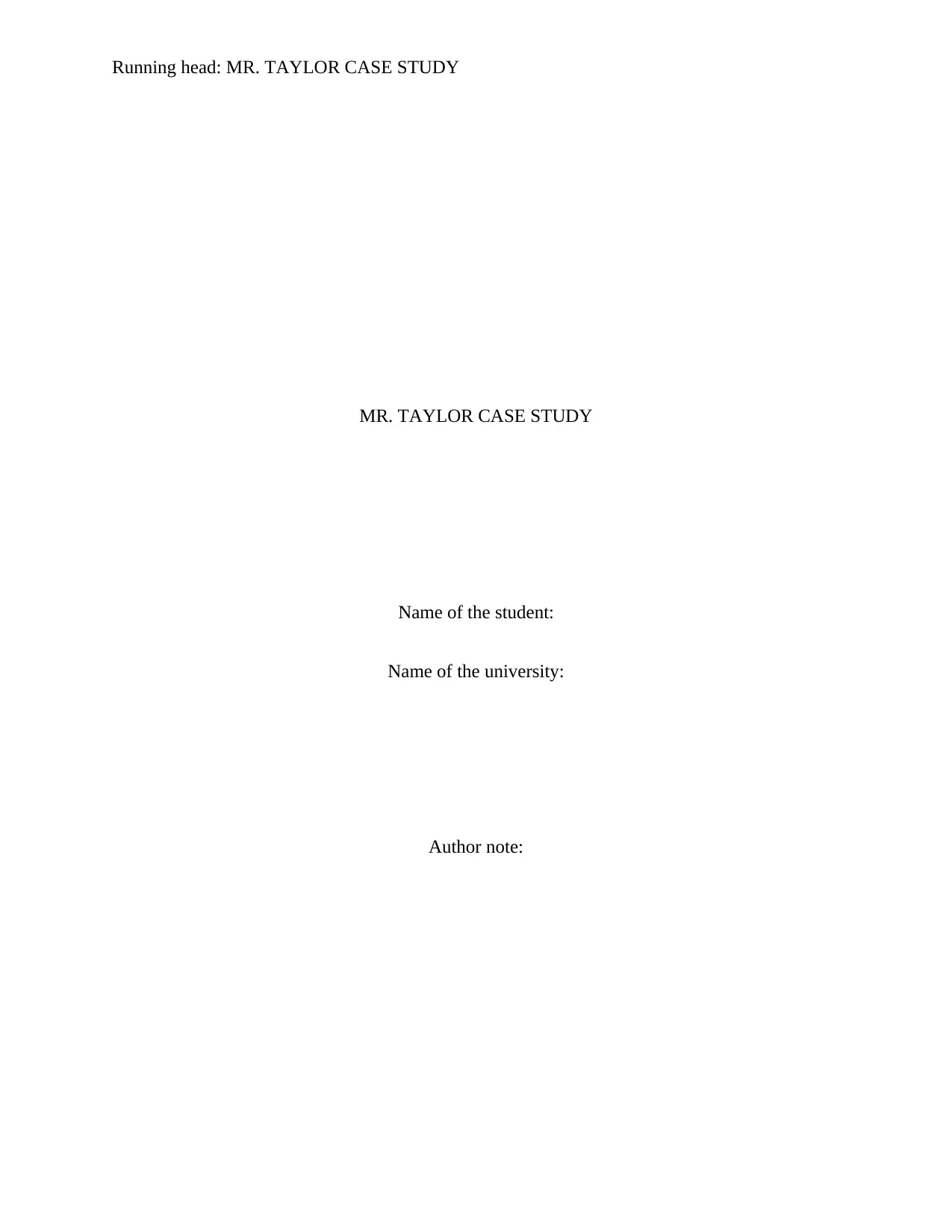
Running head: MR. TAYLOR CASE STUDY
MR. TAYLOR CASE STUDY
Name of the student:
Name of the university:
Author note:
MR. TAYLOR CASE STUDY
Name of the student:
Name of the university:
Author note:
Paraphrase This Document
Need a fresh take? Get an instant paraphrase of this document with our AI Paraphraser
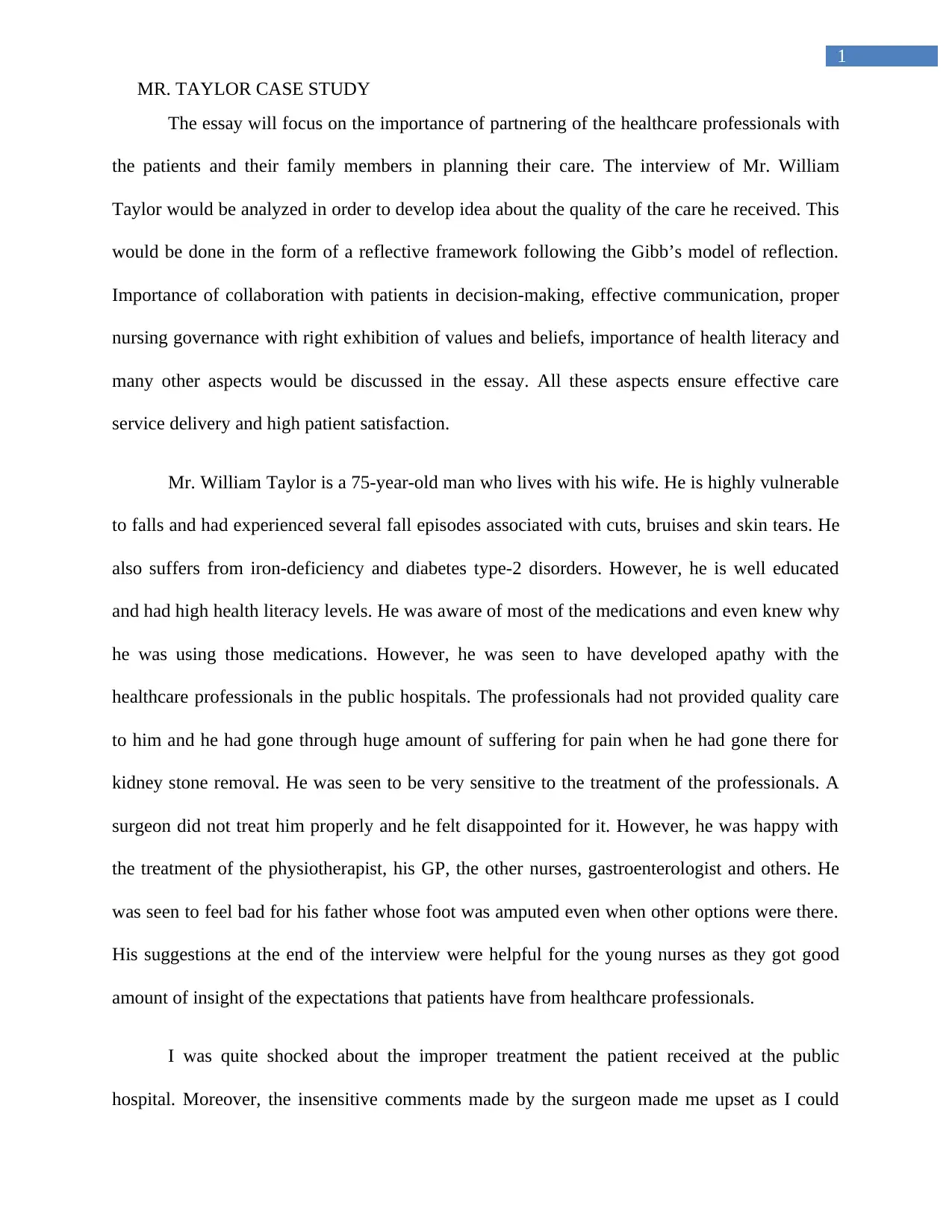
1
MR. TAYLOR CASE STUDY
The essay will focus on the importance of partnering of the healthcare professionals with
the patients and their family members in planning their care. The interview of Mr. William
Taylor would be analyzed in order to develop idea about the quality of the care he received. This
would be done in the form of a reflective framework following the Gibb’s model of reflection.
Importance of collaboration with patients in decision-making, effective communication, proper
nursing governance with right exhibition of values and beliefs, importance of health literacy and
many other aspects would be discussed in the essay. All these aspects ensure effective care
service delivery and high patient satisfaction.
Mr. William Taylor is a 75-year-old man who lives with his wife. He is highly vulnerable
to falls and had experienced several fall episodes associated with cuts, bruises and skin tears. He
also suffers from iron-deficiency and diabetes type-2 disorders. However, he is well educated
and had high health literacy levels. He was aware of most of the medications and even knew why
he was using those medications. However, he was seen to have developed apathy with the
healthcare professionals in the public hospitals. The professionals had not provided quality care
to him and he had gone through huge amount of suffering for pain when he had gone there for
kidney stone removal. He was seen to be very sensitive to the treatment of the professionals. A
surgeon did not treat him properly and he felt disappointed for it. However, he was happy with
the treatment of the physiotherapist, his GP, the other nurses, gastroenterologist and others. He
was seen to feel bad for his father whose foot was amputed even when other options were there.
His suggestions at the end of the interview were helpful for the young nurses as they got good
amount of insight of the expectations that patients have from healthcare professionals.
I was quite shocked about the improper treatment the patient received at the public
hospital. Moreover, the insensitive comments made by the surgeon made me upset as I could
MR. TAYLOR CASE STUDY
The essay will focus on the importance of partnering of the healthcare professionals with
the patients and their family members in planning their care. The interview of Mr. William
Taylor would be analyzed in order to develop idea about the quality of the care he received. This
would be done in the form of a reflective framework following the Gibb’s model of reflection.
Importance of collaboration with patients in decision-making, effective communication, proper
nursing governance with right exhibition of values and beliefs, importance of health literacy and
many other aspects would be discussed in the essay. All these aspects ensure effective care
service delivery and high patient satisfaction.
Mr. William Taylor is a 75-year-old man who lives with his wife. He is highly vulnerable
to falls and had experienced several fall episodes associated with cuts, bruises and skin tears. He
also suffers from iron-deficiency and diabetes type-2 disorders. However, he is well educated
and had high health literacy levels. He was aware of most of the medications and even knew why
he was using those medications. However, he was seen to have developed apathy with the
healthcare professionals in the public hospitals. The professionals had not provided quality care
to him and he had gone through huge amount of suffering for pain when he had gone there for
kidney stone removal. He was seen to be very sensitive to the treatment of the professionals. A
surgeon did not treat him properly and he felt disappointed for it. However, he was happy with
the treatment of the physiotherapist, his GP, the other nurses, gastroenterologist and others. He
was seen to feel bad for his father whose foot was amputed even when other options were there.
His suggestions at the end of the interview were helpful for the young nurses as they got good
amount of insight of the expectations that patients have from healthcare professionals.
I was quite shocked about the improper treatment the patient received at the public
hospital. Moreover, the insensitive comments made by the surgeon made me upset as I could
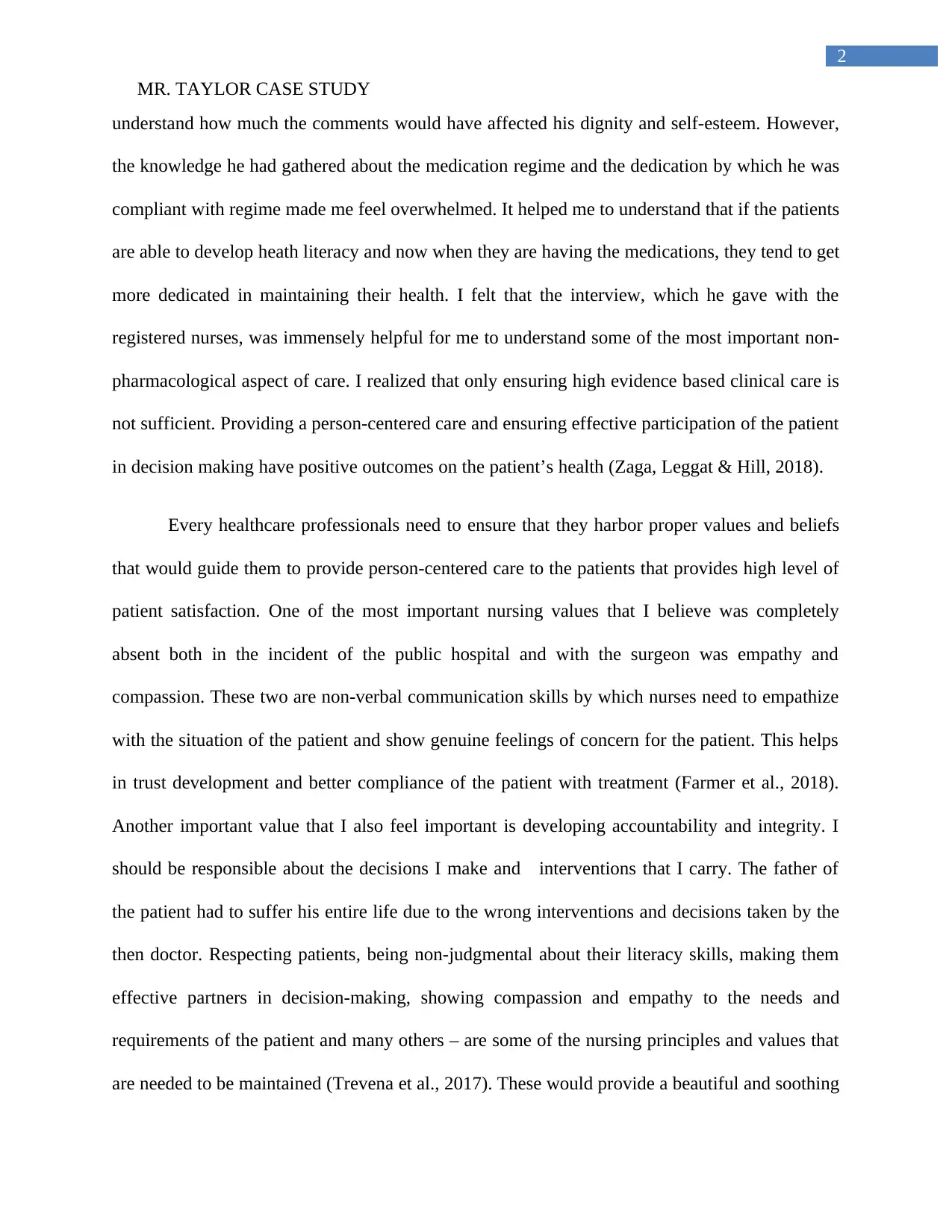
2
MR. TAYLOR CASE STUDY
understand how much the comments would have affected his dignity and self-esteem. However,
the knowledge he had gathered about the medication regime and the dedication by which he was
compliant with regime made me feel overwhelmed. It helped me to understand that if the patients
are able to develop heath literacy and now when they are having the medications, they tend to get
more dedicated in maintaining their health. I felt that the interview, which he gave with the
registered nurses, was immensely helpful for me to understand some of the most important non-
pharmacological aspect of care. I realized that only ensuring high evidence based clinical care is
not sufficient. Providing a person-centered care and ensuring effective participation of the patient
in decision making have positive outcomes on the patient’s health (Zaga, Leggat & Hill, 2018).
Every healthcare professionals need to ensure that they harbor proper values and beliefs
that would guide them to provide person-centered care to the patients that provides high level of
patient satisfaction. One of the most important nursing values that I believe was completely
absent both in the incident of the public hospital and with the surgeon was empathy and
compassion. These two are non-verbal communication skills by which nurses need to empathize
with the situation of the patient and show genuine feelings of concern for the patient. This helps
in trust development and better compliance of the patient with treatment (Farmer et al., 2018).
Another important value that I also feel important is developing accountability and integrity. I
should be responsible about the decisions I make and interventions that I carry. The father of
the patient had to suffer his entire life due to the wrong interventions and decisions taken by the
then doctor. Respecting patients, being non-judgmental about their literacy skills, making them
effective partners in decision-making, showing compassion and empathy to the needs and
requirements of the patient and many others – are some of the nursing principles and values that
are needed to be maintained (Trevena et al., 2017). These would provide a beautiful and soothing
MR. TAYLOR CASE STUDY
understand how much the comments would have affected his dignity and self-esteem. However,
the knowledge he had gathered about the medication regime and the dedication by which he was
compliant with regime made me feel overwhelmed. It helped me to understand that if the patients
are able to develop heath literacy and now when they are having the medications, they tend to get
more dedicated in maintaining their health. I felt that the interview, which he gave with the
registered nurses, was immensely helpful for me to understand some of the most important non-
pharmacological aspect of care. I realized that only ensuring high evidence based clinical care is
not sufficient. Providing a person-centered care and ensuring effective participation of the patient
in decision making have positive outcomes on the patient’s health (Zaga, Leggat & Hill, 2018).
Every healthcare professionals need to ensure that they harbor proper values and beliefs
that would guide them to provide person-centered care to the patients that provides high level of
patient satisfaction. One of the most important nursing values that I believe was completely
absent both in the incident of the public hospital and with the surgeon was empathy and
compassion. These two are non-verbal communication skills by which nurses need to empathize
with the situation of the patient and show genuine feelings of concern for the patient. This helps
in trust development and better compliance of the patient with treatment (Farmer et al., 2018).
Another important value that I also feel important is developing accountability and integrity. I
should be responsible about the decisions I make and interventions that I carry. The father of
the patient had to suffer his entire life due to the wrong interventions and decisions taken by the
then doctor. Respecting patients, being non-judgmental about their literacy skills, making them
effective partners in decision-making, showing compassion and empathy to the needs and
requirements of the patient and many others – are some of the nursing principles and values that
are needed to be maintained (Trevena et al., 2017). These would provide a beautiful and soothing
⊘ This is a preview!⊘
Do you want full access?
Subscribe today to unlock all pages.

Trusted by 1+ million students worldwide
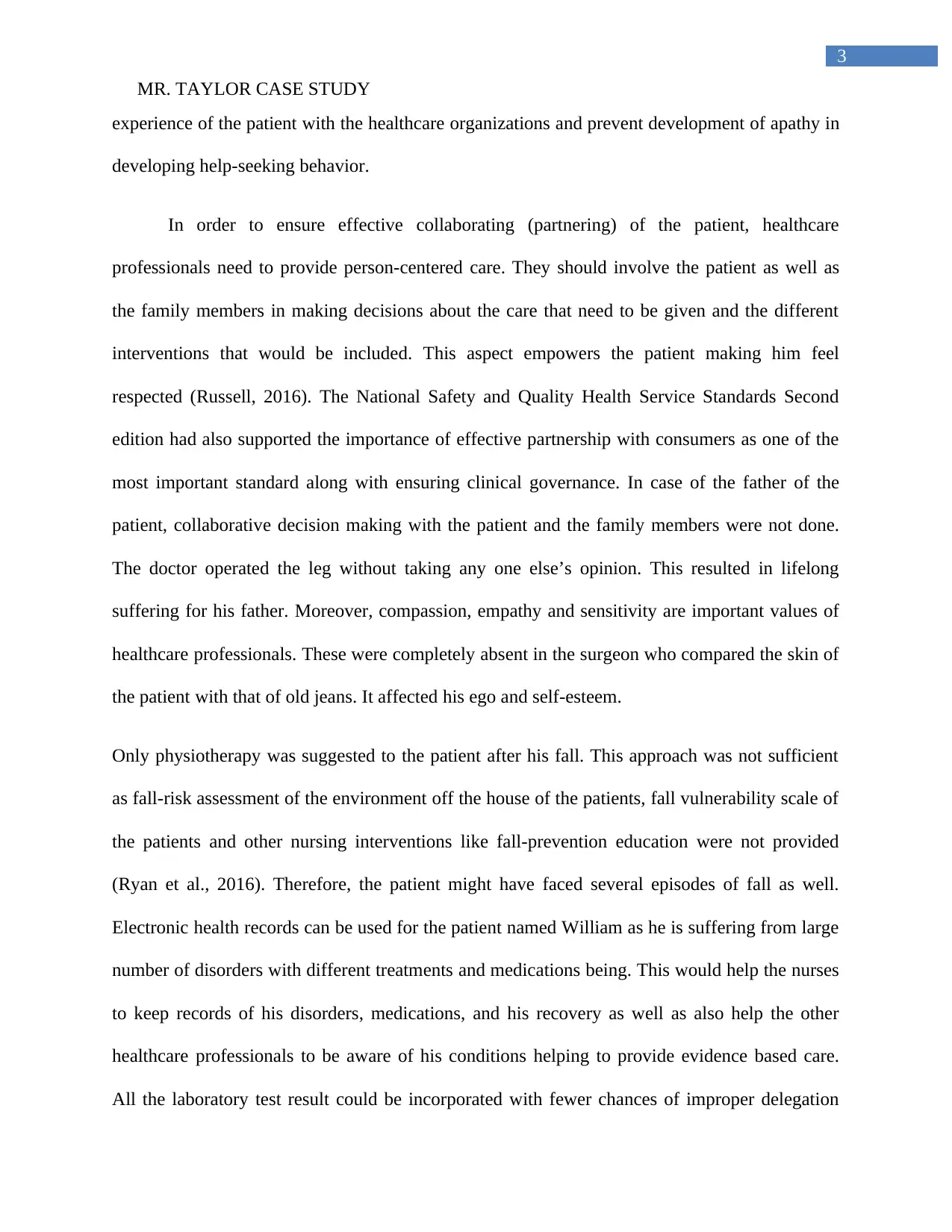
3
MR. TAYLOR CASE STUDY
experience of the patient with the healthcare organizations and prevent development of apathy in
developing help-seeking behavior.
In order to ensure effective collaborating (partnering) of the patient, healthcare
professionals need to provide person-centered care. They should involve the patient as well as
the family members in making decisions about the care that need to be given and the different
interventions that would be included. This aspect empowers the patient making him feel
respected (Russell, 2016). The National Safety and Quality Health Service Standards Second
edition had also supported the importance of effective partnership with consumers as one of the
most important standard along with ensuring clinical governance. In case of the father of the
patient, collaborative decision making with the patient and the family members were not done.
The doctor operated the leg without taking any one else’s opinion. This resulted in lifelong
suffering for his father. Moreover, compassion, empathy and sensitivity are important values of
healthcare professionals. These were completely absent in the surgeon who compared the skin of
the patient with that of old jeans. It affected his ego and self-esteem.
Only physiotherapy was suggested to the patient after his fall. This approach was not sufficient
as fall-risk assessment of the environment off the house of the patients, fall vulnerability scale of
the patients and other nursing interventions like fall-prevention education were not provided
(Ryan et al., 2016). Therefore, the patient might have faced several episodes of fall as well.
Electronic health records can be used for the patient named William as he is suffering from large
number of disorders with different treatments and medications being. This would help the nurses
to keep records of his disorders, medications, and his recovery as well as also help the other
healthcare professionals to be aware of his conditions helping to provide evidence based care.
All the laboratory test result could be incorporated with fewer chances of improper delegation
MR. TAYLOR CASE STUDY
experience of the patient with the healthcare organizations and prevent development of apathy in
developing help-seeking behavior.
In order to ensure effective collaborating (partnering) of the patient, healthcare
professionals need to provide person-centered care. They should involve the patient as well as
the family members in making decisions about the care that need to be given and the different
interventions that would be included. This aspect empowers the patient making him feel
respected (Russell, 2016). The National Safety and Quality Health Service Standards Second
edition had also supported the importance of effective partnership with consumers as one of the
most important standard along with ensuring clinical governance. In case of the father of the
patient, collaborative decision making with the patient and the family members were not done.
The doctor operated the leg without taking any one else’s opinion. This resulted in lifelong
suffering for his father. Moreover, compassion, empathy and sensitivity are important values of
healthcare professionals. These were completely absent in the surgeon who compared the skin of
the patient with that of old jeans. It affected his ego and self-esteem.
Only physiotherapy was suggested to the patient after his fall. This approach was not sufficient
as fall-risk assessment of the environment off the house of the patients, fall vulnerability scale of
the patients and other nursing interventions like fall-prevention education were not provided
(Ryan et al., 2016). Therefore, the patient might have faced several episodes of fall as well.
Electronic health records can be used for the patient named William as he is suffering from large
number of disorders with different treatments and medications being. This would help the nurses
to keep records of his disorders, medications, and his recovery as well as also help the other
healthcare professionals to be aware of his conditions helping to provide evidence based care.
All the laboratory test result could be incorporated with fewer chances of improper delegation
Paraphrase This Document
Need a fresh take? Get an instant paraphrase of this document with our AI Paraphraser
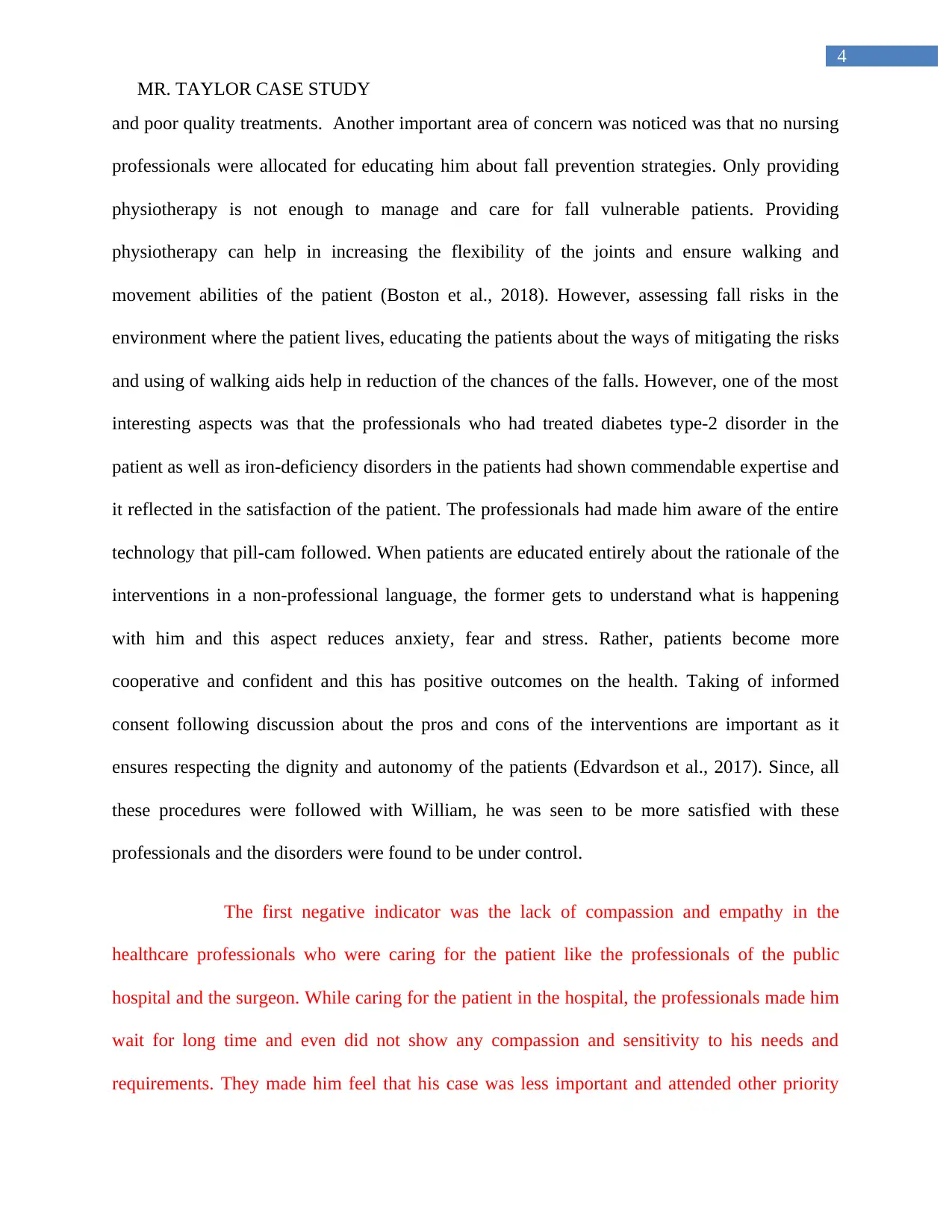
4
MR. TAYLOR CASE STUDY
and poor quality treatments. Another important area of concern was noticed was that no nursing
professionals were allocated for educating him about fall prevention strategies. Only providing
physiotherapy is not enough to manage and care for fall vulnerable patients. Providing
physiotherapy can help in increasing the flexibility of the joints and ensure walking and
movement abilities of the patient (Boston et al., 2018). However, assessing fall risks in the
environment where the patient lives, educating the patients about the ways of mitigating the risks
and using of walking aids help in reduction of the chances of the falls. However, one of the most
interesting aspects was that the professionals who had treated diabetes type-2 disorder in the
patient as well as iron-deficiency disorders in the patients had shown commendable expertise and
it reflected in the satisfaction of the patient. The professionals had made him aware of the entire
technology that pill-cam followed. When patients are educated entirely about the rationale of the
interventions in a non-professional language, the former gets to understand what is happening
with him and this aspect reduces anxiety, fear and stress. Rather, patients become more
cooperative and confident and this has positive outcomes on the health. Taking of informed
consent following discussion about the pros and cons of the interventions are important as it
ensures respecting the dignity and autonomy of the patients (Edvardson et al., 2017). Since, all
these procedures were followed with William, he was seen to be more satisfied with these
professionals and the disorders were found to be under control.
The first negative indicator was the lack of compassion and empathy in the
healthcare professionals who were caring for the patient like the professionals of the public
hospital and the surgeon. While caring for the patient in the hospital, the professionals made him
wait for long time and even did not show any compassion and sensitivity to his needs and
requirements. They made him feel that his case was less important and attended other priority
MR. TAYLOR CASE STUDY
and poor quality treatments. Another important area of concern was noticed was that no nursing
professionals were allocated for educating him about fall prevention strategies. Only providing
physiotherapy is not enough to manage and care for fall vulnerable patients. Providing
physiotherapy can help in increasing the flexibility of the joints and ensure walking and
movement abilities of the patient (Boston et al., 2018). However, assessing fall risks in the
environment where the patient lives, educating the patients about the ways of mitigating the risks
and using of walking aids help in reduction of the chances of the falls. However, one of the most
interesting aspects was that the professionals who had treated diabetes type-2 disorder in the
patient as well as iron-deficiency disorders in the patients had shown commendable expertise and
it reflected in the satisfaction of the patient. The professionals had made him aware of the entire
technology that pill-cam followed. When patients are educated entirely about the rationale of the
interventions in a non-professional language, the former gets to understand what is happening
with him and this aspect reduces anxiety, fear and stress. Rather, patients become more
cooperative and confident and this has positive outcomes on the health. Taking of informed
consent following discussion about the pros and cons of the interventions are important as it
ensures respecting the dignity and autonomy of the patients (Edvardson et al., 2017). Since, all
these procedures were followed with William, he was seen to be more satisfied with these
professionals and the disorders were found to be under control.
The first negative indicator was the lack of compassion and empathy in the
healthcare professionals who were caring for the patient like the professionals of the public
hospital and the surgeon. While caring for the patient in the hospital, the professionals made him
wait for long time and even did not show any compassion and sensitivity to his needs and
requirements. They made him feel that his case was less important and attended other priority
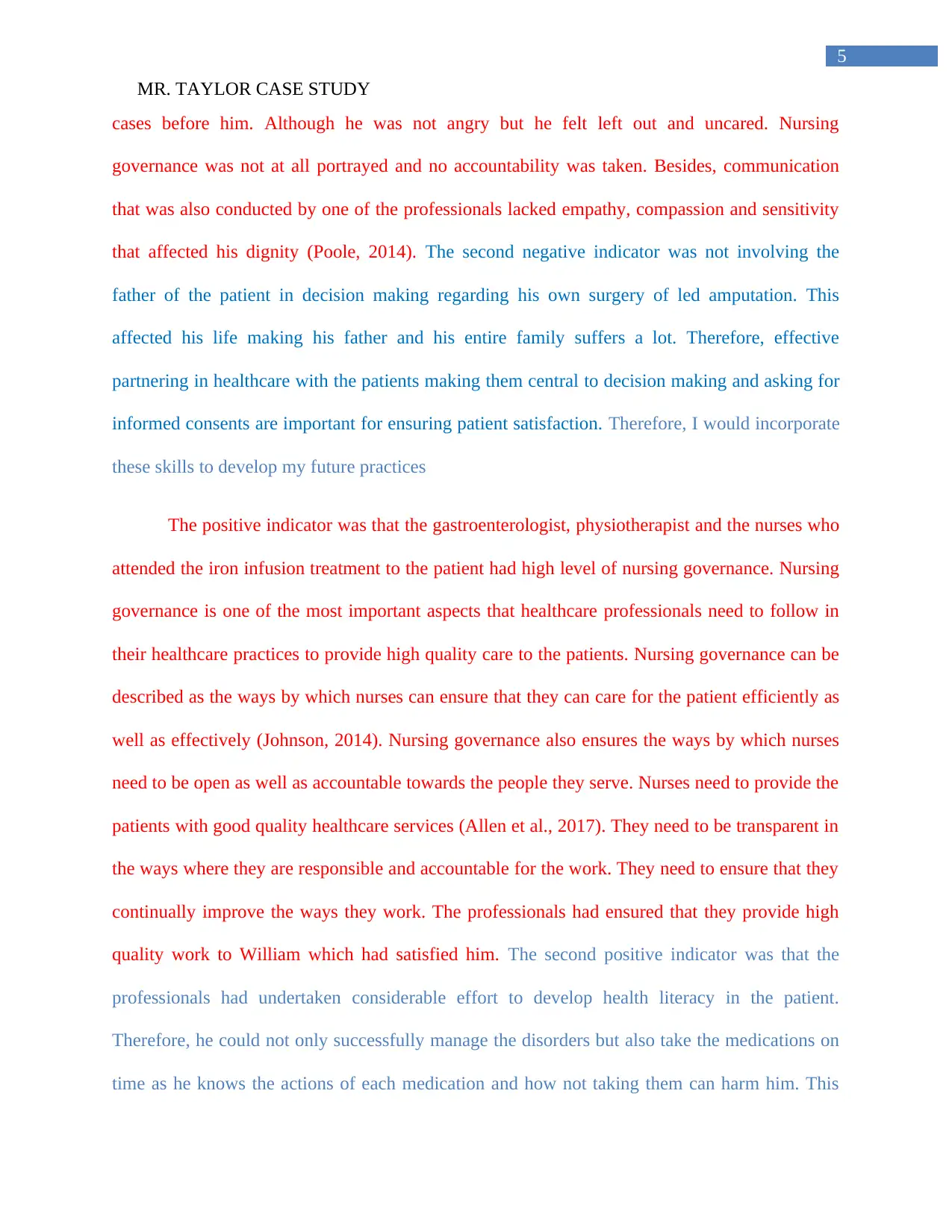
5
MR. TAYLOR CASE STUDY
cases before him. Although he was not angry but he felt left out and uncared. Nursing
governance was not at all portrayed and no accountability was taken. Besides, communication
that was also conducted by one of the professionals lacked empathy, compassion and sensitivity
that affected his dignity (Poole, 2014). The second negative indicator was not involving the
father of the patient in decision making regarding his own surgery of led amputation. This
affected his life making his father and his entire family suffers a lot. Therefore, effective
partnering in healthcare with the patients making them central to decision making and asking for
informed consents are important for ensuring patient satisfaction. Therefore, I would incorporate
these skills to develop my future practices
The positive indicator was that the gastroenterologist, physiotherapist and the nurses who
attended the iron infusion treatment to the patient had high level of nursing governance. Nursing
governance is one of the most important aspects that healthcare professionals need to follow in
their healthcare practices to provide high quality care to the patients. Nursing governance can be
described as the ways by which nurses can ensure that they can care for the patient efficiently as
well as effectively (Johnson, 2014). Nursing governance also ensures the ways by which nurses
need to be open as well as accountable towards the people they serve. Nurses need to provide the
patients with good quality healthcare services (Allen et al., 2017). They need to be transparent in
the ways where they are responsible and accountable for the work. They need to ensure that they
continually improve the ways they work. The professionals had ensured that they provide high
quality work to William which had satisfied him. The second positive indicator was that the
professionals had undertaken considerable effort to develop health literacy in the patient.
Therefore, he could not only successfully manage the disorders but also take the medications on
time as he knows the actions of each medication and how not taking them can harm him. This
MR. TAYLOR CASE STUDY
cases before him. Although he was not angry but he felt left out and uncared. Nursing
governance was not at all portrayed and no accountability was taken. Besides, communication
that was also conducted by one of the professionals lacked empathy, compassion and sensitivity
that affected his dignity (Poole, 2014). The second negative indicator was not involving the
father of the patient in decision making regarding his own surgery of led amputation. This
affected his life making his father and his entire family suffers a lot. Therefore, effective
partnering in healthcare with the patients making them central to decision making and asking for
informed consents are important for ensuring patient satisfaction. Therefore, I would incorporate
these skills to develop my future practices
The positive indicator was that the gastroenterologist, physiotherapist and the nurses who
attended the iron infusion treatment to the patient had high level of nursing governance. Nursing
governance is one of the most important aspects that healthcare professionals need to follow in
their healthcare practices to provide high quality care to the patients. Nursing governance can be
described as the ways by which nurses can ensure that they can care for the patient efficiently as
well as effectively (Johnson, 2014). Nursing governance also ensures the ways by which nurses
need to be open as well as accountable towards the people they serve. Nurses need to provide the
patients with good quality healthcare services (Allen et al., 2017). They need to be transparent in
the ways where they are responsible and accountable for the work. They need to ensure that they
continually improve the ways they work. The professionals had ensured that they provide high
quality work to William which had satisfied him. The second positive indicator was that the
professionals had undertaken considerable effort to develop health literacy in the patient.
Therefore, he could not only successfully manage the disorders but also take the medications on
time as he knows the actions of each medication and how not taking them can harm him. This
⊘ This is a preview!⊘
Do you want full access?
Subscribe today to unlock all pages.

Trusted by 1+ million students worldwide
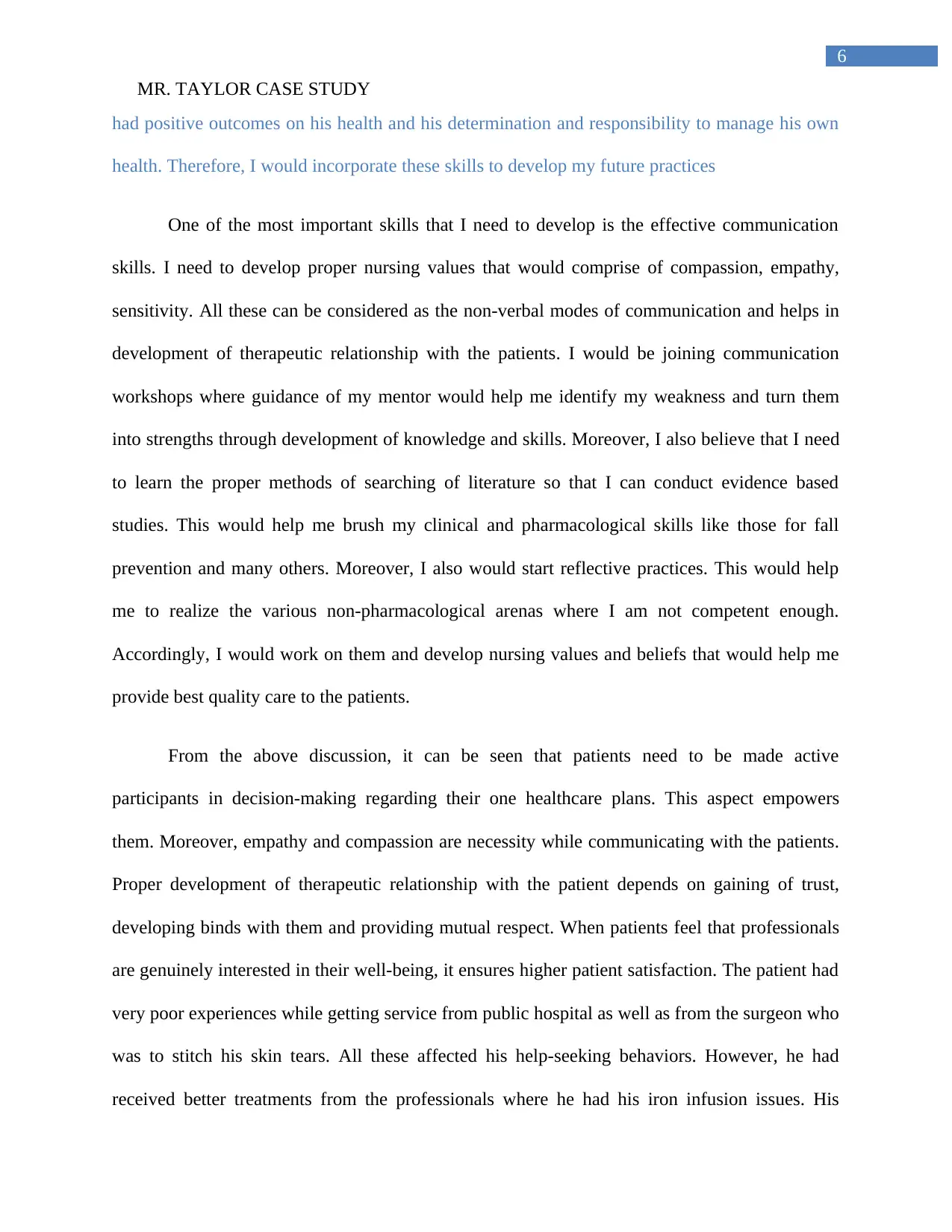
6
MR. TAYLOR CASE STUDY
had positive outcomes on his health and his determination and responsibility to manage his own
health. Therefore, I would incorporate these skills to develop my future practices
One of the most important skills that I need to develop is the effective communication
skills. I need to develop proper nursing values that would comprise of compassion, empathy,
sensitivity. All these can be considered as the non-verbal modes of communication and helps in
development of therapeutic relationship with the patients. I would be joining communication
workshops where guidance of my mentor would help me identify my weakness and turn them
into strengths through development of knowledge and skills. Moreover, I also believe that I need
to learn the proper methods of searching of literature so that I can conduct evidence based
studies. This would help me brush my clinical and pharmacological skills like those for fall
prevention and many others. Moreover, I also would start reflective practices. This would help
me to realize the various non-pharmacological arenas where I am not competent enough.
Accordingly, I would work on them and develop nursing values and beliefs that would help me
provide best quality care to the patients.
From the above discussion, it can be seen that patients need to be made active
participants in decision-making regarding their one healthcare plans. This aspect empowers
them. Moreover, empathy and compassion are necessity while communicating with the patients.
Proper development of therapeutic relationship with the patient depends on gaining of trust,
developing binds with them and providing mutual respect. When patients feel that professionals
are genuinely interested in their well-being, it ensures higher patient satisfaction. The patient had
very poor experiences while getting service from public hospital as well as from the surgeon who
was to stitch his skin tears. All these affected his help-seeking behaviors. However, he had
received better treatments from the professionals where he had his iron infusion issues. His
MR. TAYLOR CASE STUDY
had positive outcomes on his health and his determination and responsibility to manage his own
health. Therefore, I would incorporate these skills to develop my future practices
One of the most important skills that I need to develop is the effective communication
skills. I need to develop proper nursing values that would comprise of compassion, empathy,
sensitivity. All these can be considered as the non-verbal modes of communication and helps in
development of therapeutic relationship with the patients. I would be joining communication
workshops where guidance of my mentor would help me identify my weakness and turn them
into strengths through development of knowledge and skills. Moreover, I also believe that I need
to learn the proper methods of searching of literature so that I can conduct evidence based
studies. This would help me brush my clinical and pharmacological skills like those for fall
prevention and many others. Moreover, I also would start reflective practices. This would help
me to realize the various non-pharmacological arenas where I am not competent enough.
Accordingly, I would work on them and develop nursing values and beliefs that would help me
provide best quality care to the patients.
From the above discussion, it can be seen that patients need to be made active
participants in decision-making regarding their one healthcare plans. This aspect empowers
them. Moreover, empathy and compassion are necessity while communicating with the patients.
Proper development of therapeutic relationship with the patient depends on gaining of trust,
developing binds with them and providing mutual respect. When patients feel that professionals
are genuinely interested in their well-being, it ensures higher patient satisfaction. The patient had
very poor experiences while getting service from public hospital as well as from the surgeon who
was to stitch his skin tears. All these affected his help-seeking behaviors. However, he had
received better treatments from the professionals where he had his iron infusion issues. His
Paraphrase This Document
Need a fresh take? Get an instant paraphrase of this document with our AI Paraphraser
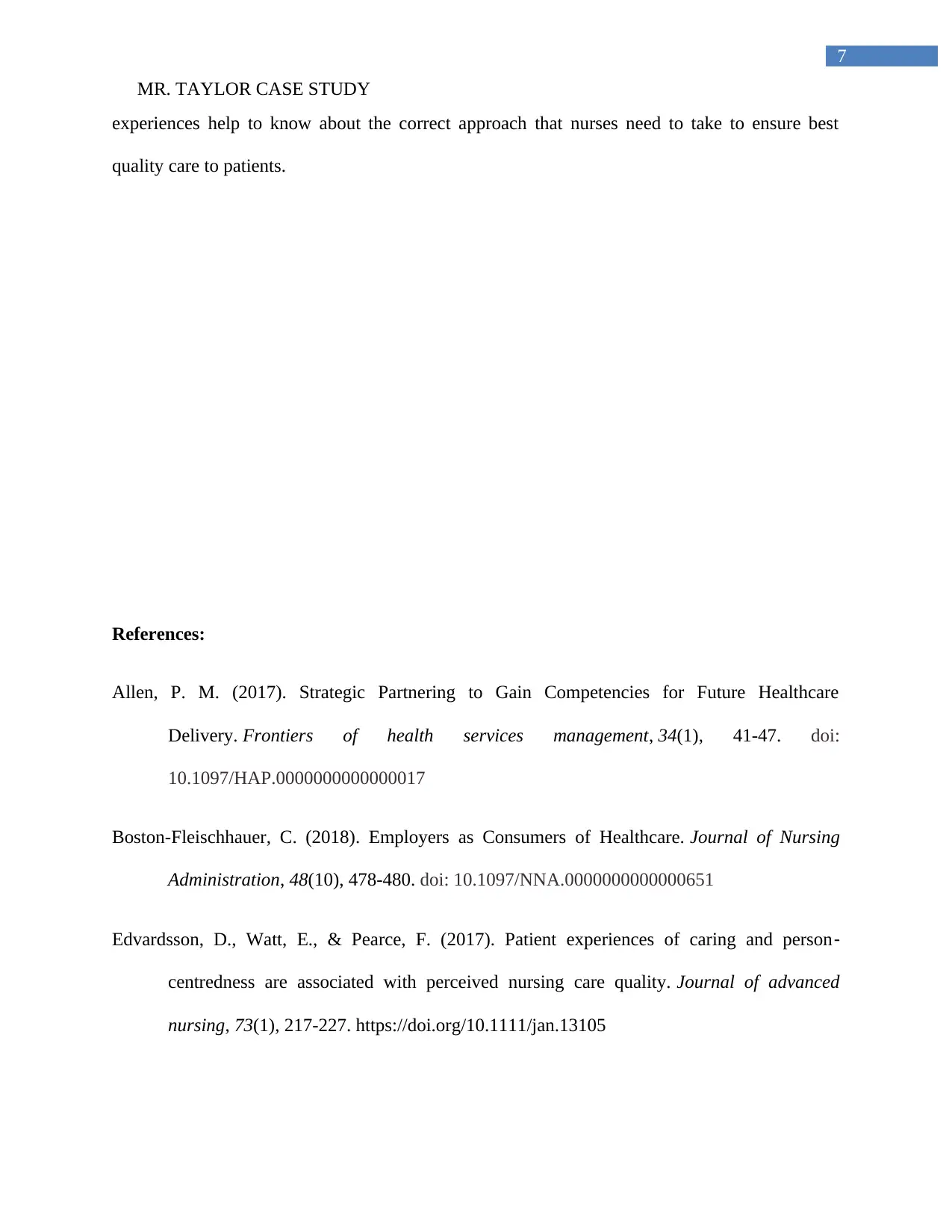
7
MR. TAYLOR CASE STUDY
experiences help to know about the correct approach that nurses need to take to ensure best
quality care to patients.
References:
Allen, P. M. (2017). Strategic Partnering to Gain Competencies for Future Healthcare
Delivery. Frontiers of health services management, 34(1), 41-47. doi:
10.1097/HAP.0000000000000017
Boston-Fleischhauer, C. (2018). Employers as Consumers of Healthcare. Journal of Nursing
Administration, 48(10), 478-480. doi: 10.1097/NNA.0000000000000651
Edvardsson, D., Watt, E., & Pearce, F. (2017). Patient experiences of caring and person‐
centredness are associated with perceived nursing care quality. Journal of advanced
nursing, 73(1), 217-227. https://doi.org/10.1111/jan.13105
MR. TAYLOR CASE STUDY
experiences help to know about the correct approach that nurses need to take to ensure best
quality care to patients.
References:
Allen, P. M. (2017). Strategic Partnering to Gain Competencies for Future Healthcare
Delivery. Frontiers of health services management, 34(1), 41-47. doi:
10.1097/HAP.0000000000000017
Boston-Fleischhauer, C. (2018). Employers as Consumers of Healthcare. Journal of Nursing
Administration, 48(10), 478-480. doi: 10.1097/NNA.0000000000000651
Edvardsson, D., Watt, E., & Pearce, F. (2017). Patient experiences of caring and person‐
centredness are associated with perceived nursing care quality. Journal of advanced
nursing, 73(1), 217-227. https://doi.org/10.1111/jan.13105
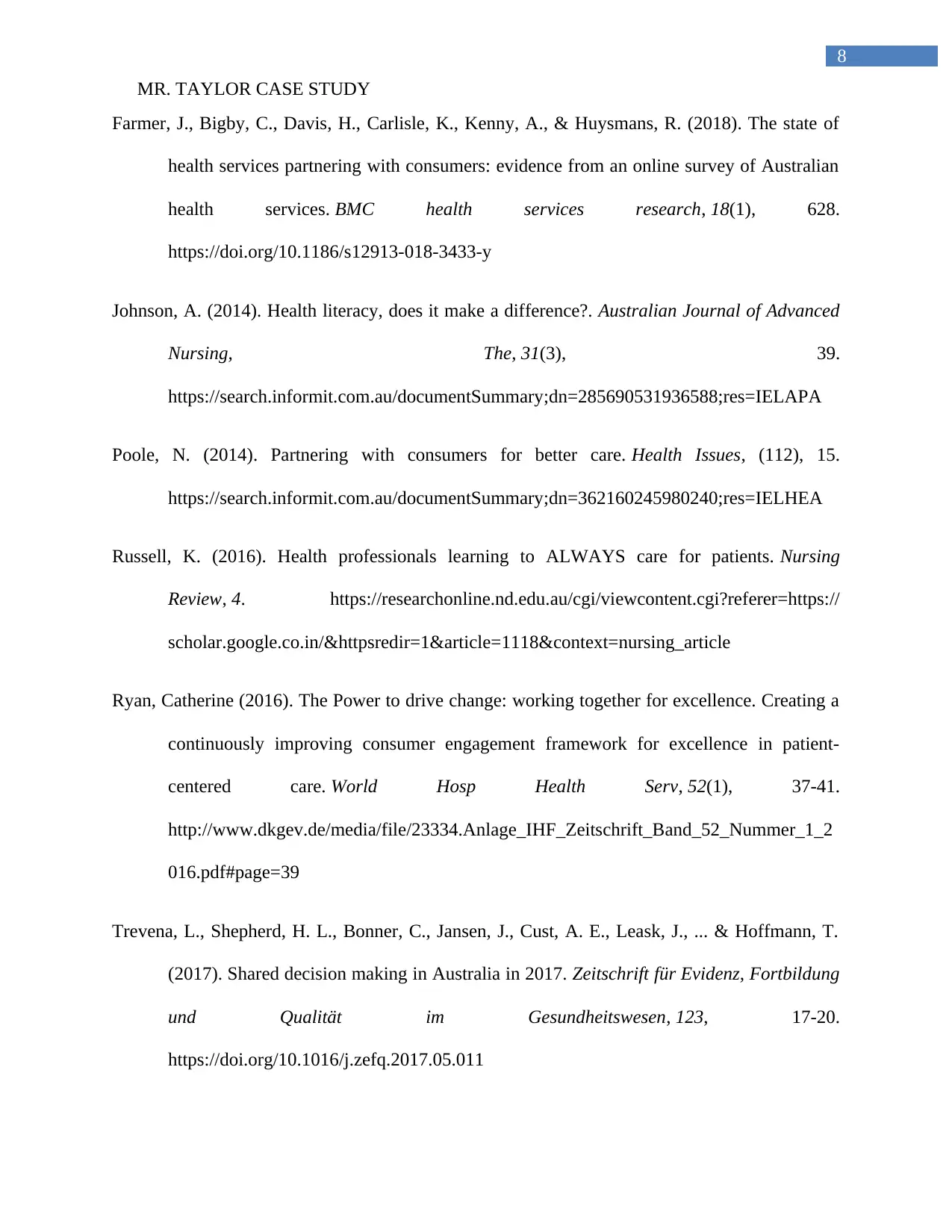
8
MR. TAYLOR CASE STUDY
Farmer, J., Bigby, C., Davis, H., Carlisle, K., Kenny, A., & Huysmans, R. (2018). The state of
health services partnering with consumers: evidence from an online survey of Australian
health services. BMC health services research, 18(1), 628.
https://doi.org/10.1186/s12913-018-3433-y
Johnson, A. (2014). Health literacy, does it make a difference?. Australian Journal of Advanced
Nursing, The, 31(3), 39.
https://search.informit.com.au/documentSummary;dn=285690531936588;res=IELAPA
Poole, N. (2014). Partnering with consumers for better care. Health Issues, (112), 15.
https://search.informit.com.au/documentSummary;dn=362160245980240;res=IELHEA
Russell, K. (2016). Health professionals learning to ALWAYS care for patients. Nursing
Review, 4. https://researchonline.nd.edu.au/cgi/viewcontent.cgi?referer=https://
scholar.google.co.in/&httpsredir=1&article=1118&context=nursing_article
Ryan, Catherine (2016). The Power to drive change: working together for excellence. Creating a
continuously improving consumer engagement framework for excellence in patient-
centered care. World Hosp Health Serv, 52(1), 37-41.
http://www.dkgev.de/media/file/23334.Anlage_IHF_Zeitschrift_Band_52_Nummer_1_2
016.pdf#page=39
Trevena, L., Shepherd, H. L., Bonner, C., Jansen, J., Cust, A. E., Leask, J., ... & Hoffmann, T.
(2017). Shared decision making in Australia in 2017. Zeitschrift für Evidenz, Fortbildung
und Qualität im Gesundheitswesen, 123, 17-20.
https://doi.org/10.1016/j.zefq.2017.05.011
MR. TAYLOR CASE STUDY
Farmer, J., Bigby, C., Davis, H., Carlisle, K., Kenny, A., & Huysmans, R. (2018). The state of
health services partnering with consumers: evidence from an online survey of Australian
health services. BMC health services research, 18(1), 628.
https://doi.org/10.1186/s12913-018-3433-y
Johnson, A. (2014). Health literacy, does it make a difference?. Australian Journal of Advanced
Nursing, The, 31(3), 39.
https://search.informit.com.au/documentSummary;dn=285690531936588;res=IELAPA
Poole, N. (2014). Partnering with consumers for better care. Health Issues, (112), 15.
https://search.informit.com.au/documentSummary;dn=362160245980240;res=IELHEA
Russell, K. (2016). Health professionals learning to ALWAYS care for patients. Nursing
Review, 4. https://researchonline.nd.edu.au/cgi/viewcontent.cgi?referer=https://
scholar.google.co.in/&httpsredir=1&article=1118&context=nursing_article
Ryan, Catherine (2016). The Power to drive change: working together for excellence. Creating a
continuously improving consumer engagement framework for excellence in patient-
centered care. World Hosp Health Serv, 52(1), 37-41.
http://www.dkgev.de/media/file/23334.Anlage_IHF_Zeitschrift_Band_52_Nummer_1_2
016.pdf#page=39
Trevena, L., Shepherd, H. L., Bonner, C., Jansen, J., Cust, A. E., Leask, J., ... & Hoffmann, T.
(2017). Shared decision making in Australia in 2017. Zeitschrift für Evidenz, Fortbildung
und Qualität im Gesundheitswesen, 123, 17-20.
https://doi.org/10.1016/j.zefq.2017.05.011
⊘ This is a preview!⊘
Do you want full access?
Subscribe today to unlock all pages.

Trusted by 1+ million students worldwide

9
MR. TAYLOR CASE STUDY
Zaga, C., Leggat, S., & Hill, S. (2018). Partnering with consumers in the public reporting of
quality of care: review of the Victorian quality of care reports. Australian Health Review.
https://doi.org/10.1071/AH16272
MR. TAYLOR CASE STUDY
Zaga, C., Leggat, S., & Hill, S. (2018). Partnering with consumers in the public reporting of
quality of care: review of the Victorian quality of care reports. Australian Health Review.
https://doi.org/10.1071/AH16272
1 out of 10
Related Documents
Your All-in-One AI-Powered Toolkit for Academic Success.
+13062052269
info@desklib.com
Available 24*7 on WhatsApp / Email
![[object Object]](/_next/static/media/star-bottom.7253800d.svg)
Unlock your academic potential
Copyright © 2020–2026 A2Z Services. All Rights Reserved. Developed and managed by ZUCOL.




